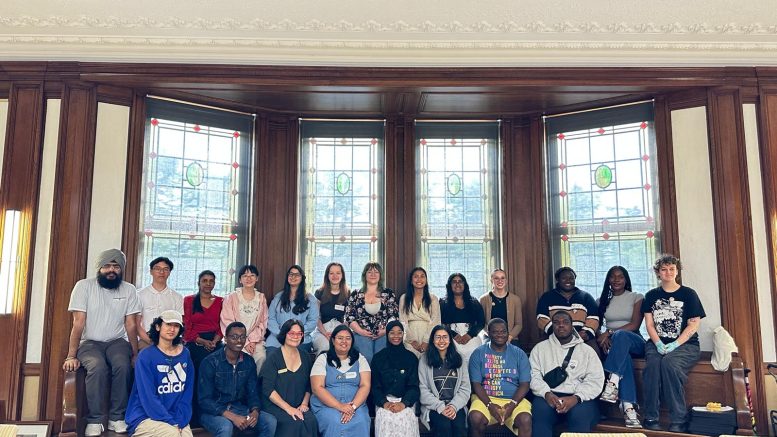The U of M’s Office of Equity Transformation hosted a one-day forum on Aug. 10 at the Fort Garry campus, bringing together student leaders committed to equity, diversity, inclusion, accessibility and anti-oppression work.
The forum provided a platform for students to share strategies, build networks and strengthen their ability to address systemic barriers on campus. Tina Chen, U of M vice-provost (equity), opened the gathering by setting the community guidelines and its purpose. “The goal was to support a whole range of students, thinking about students who are representing systemically marginalized communities on campus […] students who have been doing work on the ground to advance equity, anti-oppression, social justice, diversity inclusion,” she said.
One of the day’s central sessions was a plenary conversation moderated by Kay Maskiw-Connelly, a former fellow in the Fellows in Equity, Anti-Oppression and Social Justice program, cohort 2. The featured speaker, Kristin Witwicki, master’s student at the University of Winnipeg, drew connections between environmental change and social justice. She focused on the disproportionate impact of climate change on Indigenous and First Nations communities, stressing the need to prioritize their leadership in crafting responses.
For some of the participants, this session was the highlight. Ethan Wong, president of the U of M Book Society, said it “highlighted a connection between sustainability, climate change and equity that is often overlooked.” He added, “change starts from empathy and listening,” and emphasized the importance of creating space for First Nations communities to lead their own strategies of resilience.
The forum’s approach extended beyond traditional panels. Students were invited to engage in creative and participatory activities. Ralph Bryant, creator of the Love Notes Campaign, led an interactive session on mental health. Participants reflected on their personal experiences with mental wellness and crafted messages that will later circulate across U of M campuses as part of an awareness campaign.
Concurrent workshops which addressed intersectionality, ableism and environmental racism were carried out. These sessions offered student leaders opportunities to deepen their understanding of structural inequalities and sharpen their leadership skills.
Samiat Oni, an attendee and incoming fellow of cohort 3 of the fellowship program found these workshops as a moment of discovery. “One subject I really learned about for the first time today was accessibility in a deeper sense, not just physical accessibility, but also digital, academic and social accessibility.” She added, “I hadn’t fully realized how many barriers can exist in areas like course design, event planning or even everyday communication, and how these can unintentionally exclude people.”
The forum created a space for dialogue on representation and recognition. Participants reflected on the visibility of student-led equity initiatives, particularly in the university’s photo library and communications. Chen acknowledged the concern, saying, “We heard from a lot of students that also felt that they were doing the work, but maybe the university was not seeing their work.” She added, “We wanted to make sure that we were engaging them and coming with a way to bring people together to network and be supported in that work.”
Chen also pointed out the Fellows in Equity, Anti-Oppression and Social Justice program as a cornerstone of her office’s efforts. The nine-month initiative has supported two cohorts of students and will launch its third this fall. She said the program “is a huge highlight, not just for the opportunity and the work [with] the students […] but also knowing that this is an incredibly unique program.” She added “It really is one of the best things around this new role.”
Chen addressed the challenges inherent in equity work. “Every time I do something, someone comes forward to tell me about how it could be more and could be done better,” she said. She described this as a challenge rooted in high expectations, but one that signals trust in the university to listen and make changes.
As the day concluded, participants were invited to reflect on how future forums could be improved. The closing activity allowed students to identify priorities for more inclusive programming and stronger institutional support.
For Oni, the forum left a lasting impression of what collaboration can achieve. “I plan to take what I’ve learned and integrate it into the spaces I’m part of,” she said.
Chen hoped the forum would leave students with a sense of solidarity and possibility. “I hope that the students go away feeling like they have made valuable connections with other students […] that they can also understand that the work they are doing is connected with work happening in a whole range of places.
“I hope that they come away with some new knowledge […] a better understanding of intersectionality […] and the different ways that advocacy and activism take place so that we all come away a little bit more enriched and perhaps a little bit outside of our own comfort zones.”
The Office of Equity Transformation provides leadership at the U of M to address oppression, remove barriers to participation and advance equity, fostering a campus and community committed to accessibility, diversity and inclusion.
To explore opportunities and take part in upcoming events this fall, students can visit umanitoba.ca/equity-transformation/learning-and-engagement.

